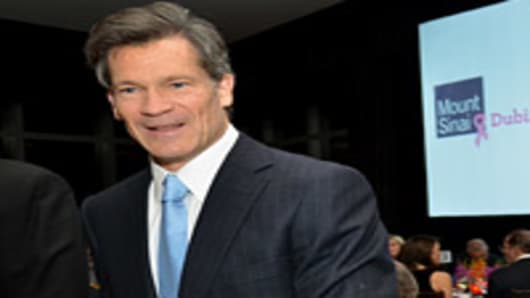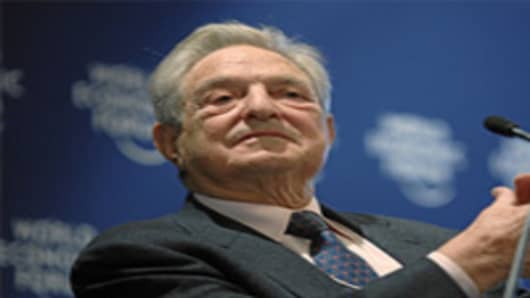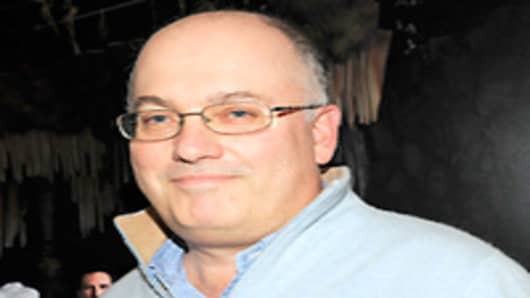It’s a humbling time for Louis Moore Bacon. The 55-year-old founder of the $15 billion Moore Capital Management — and one of the premier hedge fund investors of the past two decades — just weathered his second down year in the past four after a particularly ragged run in the markets.
His onetime heir apparent recently launched his own fund and a spate of negative publicity in the past few years has raised questions about his management.
Amid the tumult, the Dodd-Frank legislation now requires Moore and other large hedge funds to register with the Securities and Exchange Commission and provide details about their risk management, trading, and disciplinary records. Bacon is loath to reveal any of it.
That has prompted him to reconsider the way he has done business for more than 20 years, according to associates. Some, in fact, believe that in the coming years Bacon may transform Moore into what’s known as a “family office,” a far smaller operation primarily managing Bacon’s own capital as opposed to that of outside investors. “Louis has been talking about becoming a family office for at least two years,” says one investor, adding that Bacon considers the new disclosures required by the Dodd-Frank Act to be “a problem.”
Says a Moore official: “We are registering.” The official adds that the company will send an initial round of paperwork to the SEC in the coming days.
Additional details on Moore’s inner workings are liable to throw a spotlight on the troubles it has grappled with in recent years. Over the past twelve months, several prominent traders have jumped ship to start their own hedge funds, and employees fear layoffs and additional departures in the coming months, say people familiar with the matter. In 2010, the Commodity Futures Trading Commission fined Moore $25 million, one of the largest financial penalties in the agency’s history, for failing to supervise a trader who allegedly manipulated the metals markets. (Moore neither admitted nor denied liability.)
And other sensational headlines — including the arrest two years ago of a London-based Moore trader as part of a U.K. insider-trading probe and the discovery of a dead man in the hot tub atBacon’s Bahamas estate— have garnered unwanted attention. (To be fair, the arrest of Moore’s London trader, who has denied wrongdoing, was reportedly in connection with trades made for the man’s personal account, not for Moore funds. And Bacon was not implicated in the Bahamian death; the man, who managed Bacon’s estate, reportedly died of a heart attack.)
Most troubling, however, have been Moore’s lackluster numbers. For 2011, its flagship fund, Moore Global Investments, dropped 2.2 percent, raising questions about Bacon’s ability to navigate such treacherous markets. After a painful 2008, in which the fund fell 4.6 percent and investors pulled some $5 billion, Moore has sought to attract stickier money from pension funds and other more conservative institutional investors who are likely to stay the course, say people with close knowledge of the firm. But the missed opportunities of last year are giving some clients pause.
“It’s trying,” says Brad Alford, an Atlanta-based money manager who invests in Moore and several other hedge funds. He is disappointed in nearly all of them. “The years that we needed hedge funds to perform the most — in 2008 and 2011 — they failed us miserably,” Alford says.
Moore’s imminent SEC disclosures, alas, will not reveal the reasons for that failure. By March 30, any hedge fund adviser with at least $150 million under management must submit an initial round of documents to the SEC, disclosing inner workings that have largely been kept under wraps.
Basic details, like the gross assets of the firm, the disciplinary history of key players and the minimum amount of capital required to invest, will immediately be published on the SEC’s web site. More sensitive information, including nuggets about specific investments and leverage, which don’t have to be provided until later this year, will be made available only to the SEC and the Treasury Department. (They’ll use that information for their ongoing assessments of whether multi-billion-dollar fund companies like Moore pose systemic risk to the U.S. markets.)
It’s not the sort of punch list Bacon, who likes to spend the vast majority of his time trading, is eager to share. Indeed, even in an industry known for its guardedness, Bacon stands out in his desire to reveal as little as possible. Most telephone calls at Moore, which has major offices in both New York and London, have historically not been recorded, say people who have worked there.
Employees sign non-disclosure agreements, and e-mails have traditionally been deleted after just two weeks. (Under Moore’s CFTC settlement, certain e-mails and other records must now be maintained for a longer period.) During meetings with analysts or even investors, say people who have attended them, Bacon, who often draws the blinds in his private office, frequently turns to his lieutenants to answer questions, often sitting silently through the presentations.
Bacon Founded Moore in 1989 with a $25,000 inheritance from his mother.
When Bacon founded Moore in 1989 with a $25,000 inheritance from his mother, it was a different era. The idea of trading on a “macro” basis—making essentially global bets on everything from equities in the U.S. to European bonds, metals and Asian currencies — was a relatively new concept, and big market disruptions could lead to massive returns.
In Moore’s first full year, for instance, a prescient bet that Saddam Hussein would invade Kuwait generated an 86 percent return, according to a letter Bacon penned to commemorate Moore’s first two decades. Thirteen years later, the same letter explains, Bacon’s accurate predictions on the market events surrounding the Iraq war would help his flagship fund return a performance of 35 percent.
Those sorts of calls have produced a stellar record — Bacon’s flagship fund has averaged 18.8 percent returns since inception in 1989 — and they elevated Bacon’s reputation, giving him a place among the most elite hedge fund managers. He was part of the most important troika in macro trading along with Paul Tudor Jones of Tudor Investment Corp. and Stanley Druckenmiller of Duquesne Capital Management.
But the market turmoil of the past couple of years has made the trends harder to predict. Close correlations between stocks and indices, for example, have limited opportunities for big and successful trades. The actions of central banks, whose policies have helped shore up flailing economies in the U.S. and in Europe, can swing stocks and bonds on a dime. Financial institutions have taken longer than expected to recover, and one of the few lucrative investments has been one of the least daring in the book: gold. Unsurprisingly, the average hedge fund fell 5.1 percent in 2011, according to Hedge Fund Research, with macro managers declining 3.9 percent.
Between the market dislocations and the new SEC regulations, some of the hedge fund titans are beginning to bow out. Druckenmiller downshifted to a family office, as did George Soros (arguably the godfather of macro trading, but not an active hedge-fund manager recent years).
Converting his operation to a family office may not be as easy for Bacon as it has been for some of his peers. Unlike Soros Capital Management, which made the switch in recent months after returning less than $1 billion of the $25 billion it oversaw, Bacon, whose net worth is reportedly about $1.4 billion, relies on outsiders for the majority of his capital.
He also enjoys some of the highest fees in the hedge-fund business: 3 percent of the assets in Moore’s flagship fund as a management fee, and, in good years, the right to pocket 25 percent of the fund’s annual returns before sharing a penny with investors.
Bacon’s success as a trader over the years required both resources and discipline, say people who have worked with him. Before the Internet brought news to his desk at the flick of a button, he had copies of Barron’s, the weekly market tabloid, flown to his London office from the U.S. via courier. Nowadays, say people familiar with the matter, the bedside tables in his numerous properties are set up so that he can scan market data immediately upon waking without lifting his head off the pillow. A technology worker in Moore’s midtown Manhattan office travels frequently to make sure the bedside data feeds are in good working order.
Bacon brings almost as much discipline and organization to his personal life.
Bacon brings almost as much discipline and organization to his personal life as he does to his investing. His assistants routinely serve him sushi and a green shake containing apples, spinach and cucumbers to stay lean, says someone who has observed his meal preparation. One longtime assistant negotiates annual spending allowances with the elder of his children individually, say people familiar with the matter. Once they’ve agreed on a number, the assistant invites the child in for a sit-down meeting with his or her father, during which Bacon usually signs off on the terms.
Editor's Note: According to Bacon, "I strongly disagree with this characterization. My longtime assistant has assisted me in collating financial records of my kids in order to come up with a budget upon which I base their allowances after my meeting with them, the kids. She has also helped in actually paying for their bills when there have been issues and straightened out bank accounts given the headaches of dealing with banks in two countries in two currencies."
"“Louis wants to make sure that if you have a bad stretch, he can get rid of you ... Louis feels like he’s the manager of the Yankees. He can have a different team every year and they can still win the World Series.” ."
Bacon has created a culture at Moore of long hours and exacting standards. Of the numerous portfolio managers Moore has employed over the years, only about a dozen have been given $1 billion or more to manage, with the lion’s share being handled by Bacon himself. And traders, who earn a base salary of $250,000 a year at most, live in fear of having their capital and resultant bonuses scaled back if they make a bad trade and aren’t given time to earn back losses.
“Louis wants to make sure that if you have a bad stretch, he can get rid of you,” says one fixed-income trader who walked away from a potential job at Moore because of those concerns. “Louis feels like he’s the manager of the Yankees. He can have a different team every year and they can still win the World Series.”
Bacon is non-confrontational. At times he has used indirect methods to get his message across, say associates and people who have worked for him. In contrast to a rival like SAC Capital founder Stevie Cohen, who is famously vocal when he disagrees with a subordinate’s trade, say these people, Bacon finds a more subtle way to undo what he views as the potential damage: He sometimes retreats to his office and places an opposing trade, a tactic that hedge fund mavens call “fading” a colleague.
Such countermoves would often pop up on internal documents showing the positions contained in the macro funds that Bacon managed, says one person who worked for him — making it obvious to Moore insiders whom he was undermining that week. Richard Axilrod, the No. 2 at the flagship fund, would often laugh about it, say people who have witnessed the conversations. “Oh, Louis is hedging out so and so,” one of these people recalls Axilrod saying.
Then again, some at Moore suggest Bacon hasn’t been tough enough on errant employees. After all, the CFTC specifically cited the firm for failing to supervise a trader who the CFTC cited for allegedly manipulating the prices of platinum and palladiumfutures . That trader was allegedly Christopher Pia, one of Bacon’s first hires and arguably the second most powerful person at the firm at the time. (Pia, who subsequently left and founded his own hedge fund, himself reached a parallel settlement last July, agreeing to pay a $1 million fine without admitting or denying liability.)
As for Moore, it’s not clear who — if anybody — would succeed Bacon should he step down. Many regarded Greg Coffey, a former GLG Partners trader hired in 2008, as the most likely successor. But that speculation was scuttled in November when Coffey announced the launch of his own eponymous fund.
In truth, Coffey inhabits a grey zone: He continues to invest some Moore money (despite disappointing returns), uses the firm’s trading functions and is technically still a Moore employee. People familiar with the matter say Moore fixed-income trader Paul Yablon could be the next to start his own fund. Yablon denies it, saying “there is no plan to do anything of the kind.”
Having no successor in place is another reason it could make sense for Bacon to turn Moore into a family office. Either way, many of Bacon’s associates expect him to hang tough – even though, in his mid-50s, the founder could reasonably be considering retirement.
With his youngest child still a toddler, says friend and investor Charlie Krusen, Bacon has joked that “he’s tied to the grindstone for the next 18 years” if he hopes to put all his kids through college. Bacon “has a great work ethic,” Krusen says, “and he’s never going to lose your money. And I’d like to invest with him for the next ten years.” But unless Krusen discovers that he and Bacon are long-lost cousins, he may not get that chance.
*This post has been updated since its original publication.





